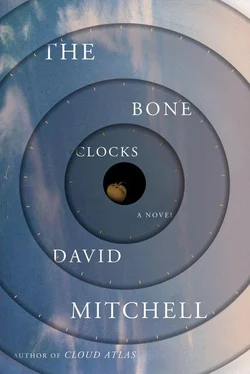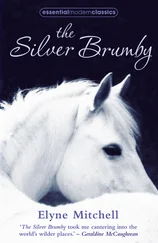“CRISPIN?” DEVON KIM-ASHKENAZY. “Are you okay?”
My postgrads’ faces suggest it was a prolonged zone-out. “Yes. I was recalling a Tanizaki novel that does wonderful things with a similar diary-narrative to yours, Devon. The Key . It could save you from reinventing the wheel. But generally,” I hand her back her manuscript, “good progress. My only cavil is the, uh, violation scene. Still a little adverb-rich, I felt.”
“Fine.” Devon uses a breezy tone to prove she’s unoffended. “The violation in the flower shop or the violation in the motel?”
“The one in the carwash. Adverbs are cholesterol in the veins of prose. Halve your adverbs and your prose pumps twice as well.” Pens scratch. “Oh, and beware of the verb ‘seem’; it’s a textual mumble. And grade every simile and metaphor from one star to five, and remove any threes or below. It hurts when you operate, but afterwards you feel much better. Japheth?”
Japheth Solomon (author of In God’s Country , a Mormon bildungsroman-in-progress about a Utah boy escaping to a liberal East Coast college where sex, dope, and a creative writing program provoke existential angst) asks, “What if we can’t decide if a metaphor’s a three or a four?”
“If you can’t decide, Japheth, it’s only a three.”
Maaza Kolofski ( Horsehead Nebula , a Utopia about life after a plague destroys every male on earth) raises her hand: “Any holiday assignments, Crispin?”
“Yes. Compose five letters from five leading characters, to yourself. Does everyone know what a letter is?”
“A paper email,” answers Louis Baranquilla ( The Creepy Guy in the Yoga Class about a creepy guy in a yoga class). My pre-Internet credentials are an ongoing joke. “What do we put into these letters?”
“Your characters’ potted life histories. Whom or what your characters love and despise. Details on education, employment, finances, political affiliations, social class. Fears. Skeletons in cupboards. Addictions. Biggest regret; believer, agnostic, or atheist. How afraid of dying are they?” I think of Holly, suppress a sigh and push on. “Have they ever seen a corpse? A ghost? Sexuality. Glass half empty, glass half full, glass too small? Snazzy or scruffy dressers? It’s a letter, so consider their use of language. Would they say ‘mellifluous’ or ‘a sharp talker’? Foul-mouthed or profanity-averse? Record the phrases they unknowingly overuse. When did they last cry? Can they see another person’s point of view? Only one-tenth of what you write will make it into your manuscript, but when you knock on that tenth”—I rap my knuckles on the table—“you’ll hear oaken solidity, not sawdust and glue. Ersilia?”
“Seems …” Ersilia Holt (a thriller named The Icepick Man about Triad gangs versus Taliban cells in Vancouver) scrunches her face, “… kinda deranged, to actually write letters to yourself?”
“Agreed, Ersilia. A writer flirts with schizophrenia, nurtures synesthesia, and embraces obsessive-compulsive disorder. Your art feeds on you, your soul, and, yes, to a degree, your sanity. Writing novels worth reading will bugger up your mind, jeopardize your relationships, and distend your life. You have been warned.”
My ten postgrads look sober. So they should.
“Art feasts upon its maker,” I tell them.
THE FACULTY STAFF room is empty but for Claude Mo (medievalist, not tenured) and Hilary Zakrewska (linguistics, not tenured either), who are engrossed in the fireside witticisms of Christina Pym-Lavit (head of political science, chair of the Tenure Committee). If their tenure track at Blithewood ends in failure, no other Ivy League college will be offering them a career. Christina Pym-Lavit waves me over. “Pull up a pew, Crispin, I was telling Hilary and Claude about the time I blew a tire while driving John Updike and Aphra Booth to the Iowa workshop, both of whom you knew, I believe?”
“Only ever so slightly,” I say.
“Don’t be coy,” says the Tenured One, but I’m not. I interviewed Updike for The New Yorker back when I was the Wild Child and shifted units in the U.S.A. I haven’t seen Aphra Booth since she threatened me with legal action in Perth, whenever that was. That pile of undergrad assignments back in my office suddenly doesn’t strike me as such an awful prospect, so I make my excuses. “Grading, on the last day of the semester?” exclaims Christina Pym-Lavit. “Would that all the staff were as conscientious, Crispin.” We agree to meet at the Christmas party later, and I head off down the corridor. As a guest lecturer I’m excused the cow’s arse of campus politics, but if I’m offered a full-time position next year, I’ll be burrowing so deep that only my shoes’ll be showing. I’ll need the salary, there’s no doubt about it. Thanks to the “recoupment arrangement” ex-agent Hal negotiated, 75 percent of my ever-dwindling book royalties go to my ex-publishers to repay money I owe. I need a job with accommodation attached, too. I’ve kept the Hampstead house, just, but it’s in the hands of a letting agent. I use the rent to pay alimony to Zoë. Alimony that Zoë refused point-blank to renegotiate: “Just because you got a Spanish girlfriend pregnant? Seriously, Crispin — why would I?” Carmen hasn’t gone all legal on me, but child care costs an arm and a couple of legs even in Spain.
“Who da’ man?” Inigo Wilderhoff clatters down the stairs with a mighty suitcase and his anchorman teeth flashing white. “I directed your friend to your office, just a minute ago.”
I stop. “My friend?”
“Your friend from England.”
“Did he give a name?”
Inigo strokes his professorial beard. “Do you know, I don’t believe he did. Fiftyish. Tall. An eye patch. My taxi’s waiting outside, I gotta fly. Enjoy tonight’s party for me. Au revoir till January.” I manage a “Take care,” but Inigo Wilderhoff’s suitcase is already thwack-thwack-thwack ing down the steps.
An eye patch? A one-eyed man.
Calm down. Calm down.
MY OFFICE DOOR is ajar. Our secretary is nowhere to be seen — security is lax at Blithewood College, two miles from the nearest town. In I peer … Nobody. Probably a mature student with corrective glasses who sounded a bit British to Wilderhoff, wanting a book signed for eBay. He’ll have seen I’m out and gone for a tactful wander until my surgery hour at three P.M. Much relieved, I walk over to my desk.
“The door was open, Crispin.”
I yelp, twist, knocking clutter from my desk onto the floor. A man is standing by my bookshelves. With an eye patch.
Richard Cheeseman stands still. “Quite an entrance.”
“Richard! You scared the sodding shit out of me.”
“Well, pardon me for scaring the sodding shit out of you.”
We ought to be clapping each other’s back, but I just gape. Richard Cheeseman’s flab had melted away after a month of Latin American prison diet, but his civilian clothes accentuate how hard, gnarled, and leathered he’s become. That eye patch — when did that happen? — gives him the air of an Israeli general. “I–I was all set to see you in Bradford after Christmas. I’ve arranged it with Maggie.”
“Then it looks like I’ve saved you a trip.”
“If I’d known you were coming here, I’d have …”
“Laid on champagne, a brass band? Not my style.”
“So”—I try to smile—“to what do I owe this pleasure?”
Richard Cheeseman sighs and bites at a hangnail. “Back in the Penitenciaría, one method of slaying minutes was to plan my first trip to New York as a free man. The tinier the details, the more minutes my reverie would kill, you see. I used to refine my plans, night after night. So , when I found myself unable to face a family Christmas at Maggie’s, full of jollity, pity, Christmas TV specials, then, naturally, New York was where I fled. And once there, what could be more appropriate than a ride up the Hudson Line to see the leading light, the chiefest friend of the Friends of Richard Cheeseman, Crispin Hershey?”
Читать дальше












